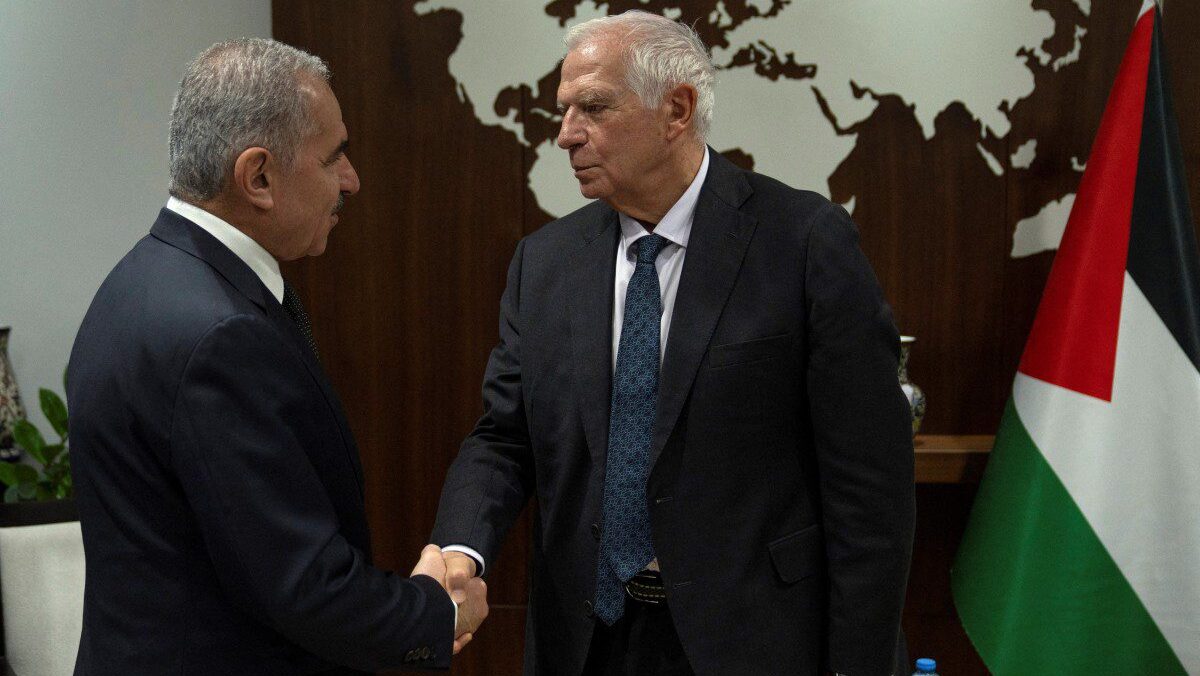
EU High Representative of Foreign Affairs Josep Borrell (right), with Palestinian Prime Minister Mohammed Shtayyeh in Ramallah, West Bank, in November 2023.
Photo: NASSER NASSER / POOL / AFP
EU countries agreed that the regular financing of the Palestinian Authority must resume as the European Commission’s own internal review found “no breach of EU law,” Brussels’ foreign affairs chief, Josep Borrell, said after Monday’s Council meeting with the bloc’s foreign affairs ministers. Meanwhile, the Commission will be preparing a sanctions proposal to punish ‘extremist’ Jewish settlers who allegedly take part in violence against Palestinians in the West Bank.
At the year’s last Foreign Affairs Council, ministers discussed a broad range of possible next steps to take with regard to the Middle East crisis, put forward by the EU’s diplomatic service (EEAS) in a paper that has been circulating since last week.
Most importantly, the ministers agreed (according to Borrell) that EU funding to Palestinians—which was frozen in the wake of the October 7th attacks due to the fear of EU taxpayers’ money being misused to fund terrorism-related activities—must resume, as the Commission is ready to conclude its internal review on the matter.
“The review of the EU assistance … found no evidence [of any] breach of EU law; no[r] any kind of signal that this money could be funding terrorism or fueling hatred or antisemitism,” Borrell said at Monday’s press conference, adding that the Council received “assurances from the Commission that this support will be released.”
Several EU diplomats, however, couldn’t agree less.
Conservative MEPs from all three right-wing parties have raised numerous alarming issues over the past couple of weeks, including the Palestinian Authority’s ‘pay for slay’ programs, which directly incentivize terrorist attacks against Israel, as well as the blatant indoctrination, antisemitism, and incitement to violence in the schools run by the UNRWA—the UN organization that has been practically taken over by Hamas activists and sympathizers.
“There is so much evidence, so much evidence that our money [given to the Palestinians] is being misused in different ways, directly and indirectly … to support terrorist organizations,” MEP Bert-Jan Ruissen (ECR) said at a parliamentary hearing in October.
In the past two years, the EU disbursed €681 million to the Palestinian Authority (PA) and the UNRWA—one-third, or about €225 million, went directly to Hamas-controlled Gaza. Now these funds will not only resume, but the Commission also plans to triple the EU aid meant for Gaza.
Israel, however, calls for exactly the opposite. Last week, Knesset member Sharron Haskel was in Brussels at the ECR group’s invitation, where she pleaded for EU countries to stop financing the UNRWA, as the indoctrination and perpetual violence will not stop until the agency is dismantled.
Knesset member @SharrenHaskel speaking at @Europarl_EN: terrorist indoctrination in #Gaza will only stop when the @UNRWA is dismantled.@CristianTerhes @ecrgroup @EuroConOfficial pic.twitter.com/LYPqnePf6b
— Tamás Orbán (@TamasOrbanEC) December 6, 2023
Another major point of discussion at the foreign affairs meeting was the alleged violence of ‘extremist’ Jewish settlers in the West Bank, as the Commission is facing increased pressure from several member states to address the issue.
According to Borrell, the Council is “alarmed by the violence in the West Bank by extremist settlers” and “will work on imposing sanctions,” such as travel bans, on individuals suspected of taking part. Borrell promised he would submit concrete proposals to the member states shortly.
As we wrote before, Brussels’s stance on the alleged ‘settler terrorism’ is based on reports coming from the UN and its humanitarian office, OCHA, and the statistics are heavily biased against the Israeli side.
“This [OCHA] campaign is a total incitement,” Sarah Ha’etzni Cohen, the head of the Zionist advocacy group My Israel, explained to The European Conservative last month, telling us that the UN agency is ignoring the increased attacks on Jews and instead recording their legitimate self-defense as terrorist incidents.
“They are trying to repaint reality to a different color, but those of us who live here see what is actually happening on the ground,” Ha’etzni Cohen said. “They try to equate Jewish settlers with Hamas. But there is no equation between murderous terrorists and people trying to defend their families.”
Back in Brussels, however, any such sanctions are unlikely to garner unanimous support, regardless of what the Commission will come up with. While the more pro-Palestinian member states (such as Ireland, Spain, Belgium, and France in this regard) have expressed support for the measure, Israel’s staunchest European allies, including Germany, Hungary, Austria, and the Czech Republic, would most likely refuse to get onboard.
Furthermore, the Council will propose its own peace plan in the coming weeks, as Borrell promised, which will be based on the two-state solution.
“We believe [the two-state solution is] the best, if not the only, solution to give security and peace both to Israel and Palestine,” Borrell said. “The security of Israel cannot be reached just by military means. It requires a political settlement of the conflict.”
